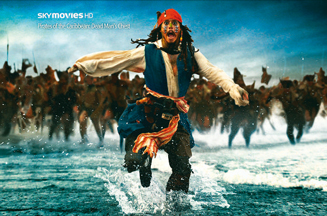
It is no exaggeration to say that in its two decades in business, Sky has driven a revolution in the way TV is consumed, with profound consequences for advertisers.
Since 1989 it has gone from being a satellite-only broadcaster with four channels to a multimedia operator offering broadband internet and telephony as well as more than 500 channels to 9.2m homes. It sells 9.5m TV ad slots a year and its portfolio of 180 websites racks up 2.5bn ad impressions a month.
'At the cutting edge' is how Nigel Walley, managing director of Decipher Consultancy, describes Sky. As well as pioneering new technology, including red-button advertising, digital broadcasting and PVR capability, the media group claims an impressive list of UK broadcasting landmarks. It was the first to offer 24-hour news coverage, broadcast every match of an overseas international rugby union tour and stream live football online, as well as becoming the world's first carbon-neutral media company in 2006. Most crucially, it also introduced pay-TV services to the UK.
Given this track record, Brian Sullivan, managing director of Sky's customer group, is keen to keep ahead of the game and is throwing its weight - and considerable resources - behind pushing high-definition TV. 'No one knows for certain where broadcasting is going to go in the next 20 years, but we are currently going through a transition in to HD,' which, he says, is set to become the new standard for TV.
Migration patterns
Further growth over the next few years will occur in the convergence of the internet and TV. Sky's Anytime service downloads programmes directly to a subscriber's set-top box, but in the near future it will introduce a broad-band connection direct to the box enabling the expansion of its on-demand offering.
Rhys McLachlan, head of broadcast futures at MediaCom, believes this is a wise strategy, because he expects viewers will continue to migrate to on-demand TV, at home and on the move.
Sky offers a limited mobile TV service already, but McLachlan predicts that this medium will fast become a viable option for watching TV, as handsets become more advanced and mobile internet access more widespread. However, viewers and advertisers are moving toward mobile broadcasting slowly, waiting for operators to catch up and start offering more internet-inclusive deals and faster connections. Advertisers will take more advantage of the channel once this develops, he says.
Tess Alps, chief executive of commercial TV marketing body Thinkbox, said at a recent seminar that the internet offers endless opportunities for both viewers and advertisers as it makes content interactive. Jenny Biggam, partner at media agency the7stars, agrees, and points out that the internet also offers up direct information about the audience. Brands can therefore get the precise measurements available with online advertising, but with the quality of a video ad and a higher likelihood that the sound will be on.
What this means for advertisers is more effective targeting and clearer measurements. Like viewers, brands will have greater choice over where their ads reach viewers and which individuals are targeted. With this choice, however, also comes a greater responsibility for advertisers to produce engaging, high-quality ads.
The first fully HD ad campaign is yet to be developed: to date, only Sony and Ford have attempted a one-off HD execution. Sullivan is convinced that this will be the next 'revolution' for advertisers. What are the odds that this could be another first for Sky? N
Sky's highlights
2008 Sky demonstrates 3D TV in the home for the first time
2006 Launch of first nationwide HD TV service, Sky+ HD
2005 Launch of Sky Mobile TV, offering access to a range of live TV channels via mobile devices
2001 Launch of Sky+
2000 Sky runs first interactive 'red-button' ad
1998 Launch of Sky Digital
1997 Launch of pay-per-view films
1993 Sky launches first package of basic subscription channels
1991 BSkyB, formed by merger of Sky and British Satellite Broadcasting in 1990, rebrands BSB's The Sports Channel as Sky Sports
1990 Sky Movies becomes the UK's first subscription channel
1989 Sky launches four-channel satellite TV package: Sky Channel, Sky News, Sky Movies and Eurosport

